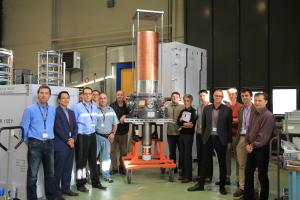Successful European collaboration on gyrotron prototype
5 Dec 2015
Representatives from the European Domestic Agency, the European Gyrotron Consortium, and Thales Electron Devices stand next to the continuous-wave gyrotron prototype, which has successfully passed final factory acceptance tests.
In ITER, powerful radio-frequency-generating devices called gyrotrons will generate microwave beams over a thousand times more powerful than a traditional microwave oven. These gyrotrons are part of the electron cyclotron heating system, one of the three systems that will heat the plasma in the ITER machine to 150 million degrees Celsius.
In ITER, 24 gyrotrons will provide a total combined heating power of 24 MW. R&D work is progressing on gyrotrons in Europe, India, Japan and Russia as part of the development of the electron cyclotron system.
Europe, responsible for the in-kind procurement of six gyrotrons, is working on the development of the final gyrotrons in collaboration with the European Gyrotron Consortium—made up of the European fusion laboratories KIT (Germany), the Swiss Plasma Center (Switzerland), HELLAS (Greece), and CNR (Italy), as well as the German USTUTT and Latvian ISSP as third parties—and Thales Electron Devices (France). Two industrial prototypes are currently in fabrication: a short-pulse gyrotron, capable of producing radio frequency of 1 MW for a few milliseconds; and a longer-pulse continuous-wave prototype, capable of producing a radiofrequency wave for several minutes.
Following the pre-validation of the short-pulse gyrotron design in April 2015, the European Domestic Agency recently announced that the continuous-wave gyrotron prototype has successfully passed the final factory acceptance tests, in an important sign of progress for the program.
The factory acceptance tests for the long-pulse continuous-wave gyrotron prototype, which will produce radiofrequency microwaves of 1MW of output power for a duration of several minutes, took place at the Thales facility near Paris. The tests comprised the checking of ultra-high vacuum level in order to guarantee long-pulse stable operation, the cooling circuits for dissipating the high heat fluxes of some internal components, and the high voltage withstand-off of the different gyrotron parts which are needed to accelerate the electrons at good efficiency.
The completion of the factory acceptance tests is an important milestone, bringing the European agency closer to the critical phase of validation of the European gyrotron for ITER.
Read the full story on the European Domestic Agency website.


